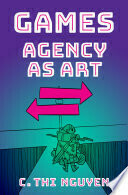
"Games are a unique art form. The game designer doesn't just create a world; they create who you will be in that world. They tell you what abilities to use and what goals to take on. In other words, they specify a form of agency. Games work in the medium of agency. And to play them, we take on alternate agencies and submerge ourselves in them. What can we learn about our own rationality and agency, from thinking about games? We learn that we have a considerable degree of fluidity with our agency. First, we have the capacity for a peculiar sort of motivational inversion. For some of us, winning is not the point. We take on an interest in winning temporarily, so that we can play the game. Thus, we are capable of taking on temporary and disposable ends. We can submerge ourselves in alternate agencies, letting them dominate our consciousness, and then dropping them the moment the game is over. Games are, then, a way of recording forms of agency, of encoding them in artifacts. Our games are a library of agencies. And exploring that library can help us develop our own agency and autonomy. But this technology can also be used for art. Games can sculpt our practical activity, for the sake of the beauty of our own actions. Games are part of a crucial, but overlooked category of art - the process arts. These are the arts which evoke an activity, and then ask you to appreciate your own activity. And games are a special place where we can foster beautiful experiences of our own activity. Because our struggles, in games, can be designed to fit our capacities. Games can present a harmonious world, where our abilities fit the task, and where we pursue obvious goals and act under clear values. Games are a kind of existential balm against the difficult and exhausting value clarity of the world. But this presents a special danger. Games can be a fantasy of value clarity. And when that fantasy leaks out into the world, we can be tempted to oversimplify our enduring values. Then, the pleasures of games can seduce us away from our autonomy, and reduce our agency."--